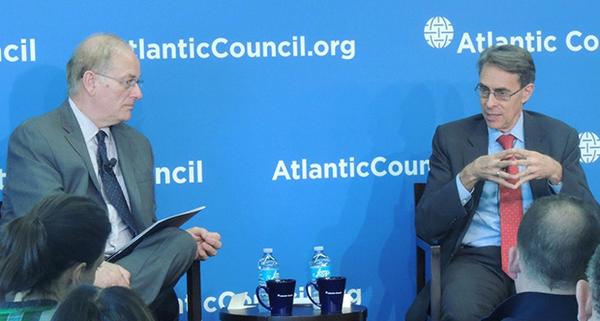 On May 18, 2016, the Atlantic Council’s Rafik Hariri Center for the Middle East hosted Human Rights Watch (HRW) executive director Kenneth Roth for a discussion with Rafik Hariri Center director Frederic C. Hof on the human cost of the Arab conflicts. Roth opened the discussion with remarks on the complex challenges in the Middle East region, after which he and Ambassador Hof discussed the intersection between political and human interests to address these issues.
On May 18, 2016, the Atlantic Council’s Rafik Hariri Center for the Middle East hosted Human Rights Watch (HRW) executive director Kenneth Roth for a discussion with Rafik Hariri Center director Frederic C. Hof on the human cost of the Arab conflicts. Roth opened the discussion with remarks on the complex challenges in the Middle East region, after which he and Ambassador Hof discussed the intersection between political and human interests to address these issues.
Roth’s remarks provided a nuanced and direct account of human rights issues across the Middle East. Regarding Syria, Roth discussed the shortcomings of Secretary John Kerry’s strategy: to address humanitarian issues by making peace. Roth explained that the United States should pressure Russian President Vladimir Putin to put an end to Syrian government-sponsored atrocities, and stressed that this must be a pre-requisite for any role for Syrian President Bashar al-Assad in a transitional governing body. Roth discussed the issue of proportionality in Yemen, where HRW teams conduct on-the-ground evaluations to determine the proximity of strikes to legitimate military targets. He also shared the humanitarian implications for banking on creation of a global national accord in Libya, and the consequences of a long term occupation—which by definition is a temporary measure—in the West Bank.
Roth concluded his opening remarks by emphasizing the grave consequences of rhetoric that suggests the United States should engage in human rights violations, such as carpet bombing or torture. He stressed that maintaining a strong norm against these and other violations is in the best of interest for the United States, as if that norm were to change, the United States would lose any moral argument against indiscriminate attacks from the Islamic State (ISIS) or other actors.
In discussion with Hof, Roth said human rights organization can advocate for military use of force as the absolute last option, if such action would likely be effective, and if it has minimal negative consequences. He explained that, in his opinion, the genocide convention is too narrow, as the international community should also consider mass slaughter for political reasons a “never again” scenario. He further stated that response to a “never again” scenario must not hinge on a UN Security Council determination, as that precludes action when the perpetrator is a friend—or member—of the P5.
